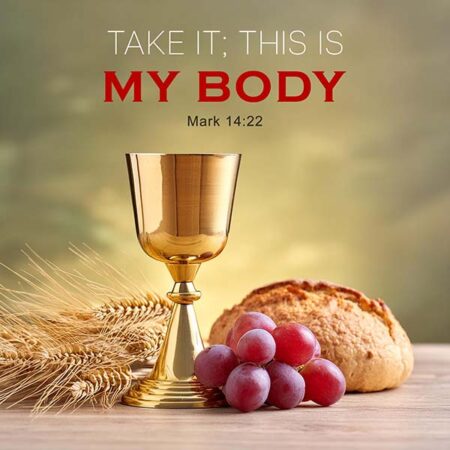By the Faithful Disciple
Grow As a Disciple
The Feast of Corpus Christi celebrates the great Christian mystery of the Eucharist – that Jesus Christ is really, truly, and substantially present under the appearances of bread and wine. At the Last Supper, Jesus breaks the bread and passes the cup of wine, telling his disciples to take, and eat, this is his body and blood. In the Old Testament, as we saw in the first reading, blood was seen as both a sacrifice and a covenant, a promise between God and his chosen people. Jesus says he is the new covenant and instructs his disciples to do as he has done, in memory of him. The layers to what Jesus is saying are many: He is the new promise between God and people; he will be the sacrifice; and yet he will remain with them when they partake in the Eucharist. The salvation of all people is wrapped up in this seemingly simple act of eating bread and drinking wine because Jesus transcends time, just as he transcended death, to be truly present to us in the sacrament. What a profound and beautiful act of love! One we can barely begin to understand with our human minds. The first disciples likely didn’t understand it either, at least not at first. But with time, and with the wisdom of the Holy Spirit, they came to see just how transformative that Passover meal was.
Go Evangelize
Our faith contains many great mysteries that challenge our modern sensibilities. After all, we live in a time where many think that there ought to be no mysteries. Need an answer? Look it up online! But no matter how much knowledge we have, God’s ways are still a mystery to us. Why did Jesus have to die? Why can’t he return now? How do we know he’s really present in the Eucharist? Rather than shying away from the mysteries of faith, perhaps we should try to become more comfortable with the unknowable and be willing to talk about it. After all, we may not understand exactly how the sun works, but we can feel its warmth. We can’t prove the love of a parent or a friend, but we know it’s there. God’s love, and the mysteries of the Eucharist, can be felt and experienced, and can change our lives.
Pray
Today the Church sings what is called a “sequence,” a hymn sung after the second reading but before the Gospel acclamation. There are only four days in the liturgical year that include a sequence, and today’s hymn was composed in 1274 by St. Thomas Aquinas: Lauda Sion, or Praise the Savior oh Zion. Spend some time this week with the words of this hymn, either in prayerful reading or perhaps listening to a sung version.

